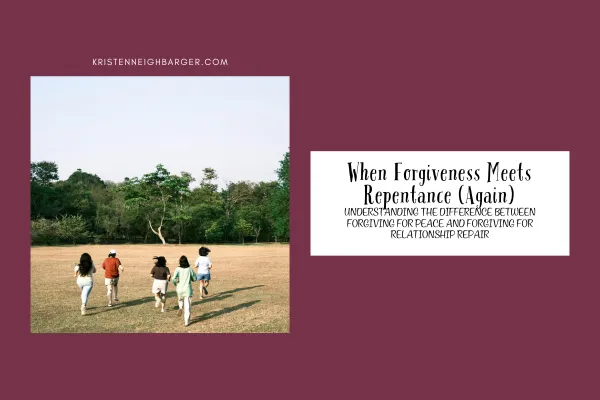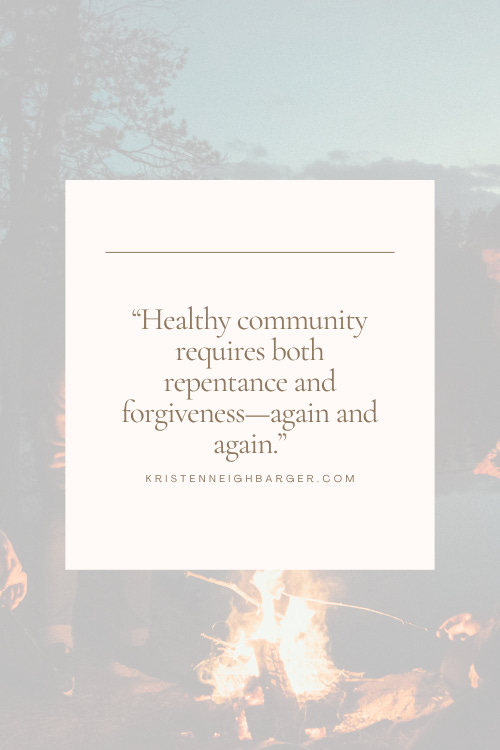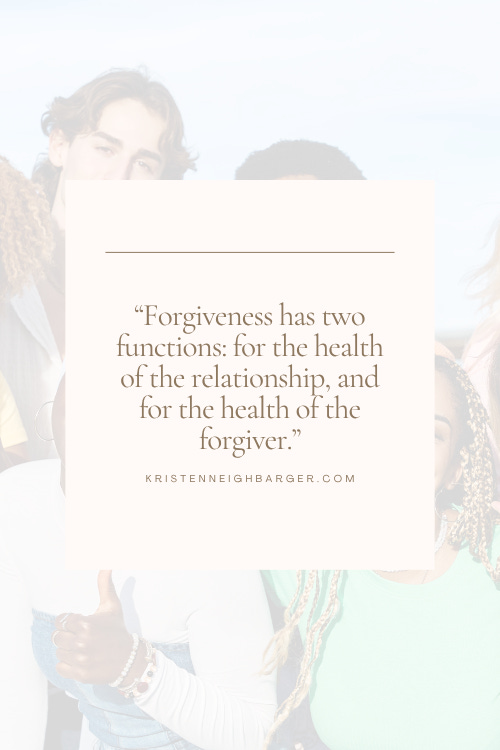
Forgiveness Meets Repentance (Again)
Relationships are hard.
Last week I wrote about Jesus’ teaching on betrayals, repentance, and forgiveness in Luke 17 (vv. 3–4). I honestly didn’t think that post would be controversial. How do you argue with the idea that healthy relationships need both repentance and forgiveness?
And yet—so many responses landed on “forgive but don’t forget,” “forgive but don’t trust,” or “forgive the unrepentant for your own sake.” Helpful ideas in some contexts, yes. But they weren’t what Jesus was addressing in Luke 17.
The Context We Can’t Skip
Jesus is talking to His disciples about life inside their community—established relationships. He says:
“If your brother or sister sins, rebuke them; and if they repent, forgive them. Even if they sin against you seven times in a day and seven times come back to you saying ‘I repent,’ you must forgive them” (Luke 17:3–4).
Key words: brother/sister (in-community), rebuke (name the harm), if they repent (turn and repair), forgive (release the debt).
The disciples hear this and immediately pray, “Increase our faith!” (v. 5). Same, friends. Same.

Two Functions of Forgiveness
Here’s where so many comments missed the point: Jesus talks about forgiveness in two different ways.
For the health of the relationship (Luke 17:3–4)
Aim: unity and repair.
Ingredients: naming the harm, repentance, forgiveness, and continued relationship.
Outcome: restoration because both parties engage.
For the health of the forgiver (Matt. 5:23–24; 6:12–15; 18:21–22; Mark 11:25; Luke 6:37; 11:4)
Aim: unclog the heart before God; worship without bitterness.
Ingredients: releasing the debt to God, often without reconciliation.
Outcome: spiritual freedom for the forgiver regardless of the other person’s posture.
Both are biblical. They’re just not the same thing.
Luke 17 isn’t about clearing your conscience in isolation; it’s about maintaining healthy relationships through repentance and forgiveness.
✨ Quick note for the wounded: Forgiveness does not require proximity to ongoing harm. Safety and boundaries are faithful. Forgiveness may be offered to God without reconciliation when repentance is absent or trust remains unsafe.
Why This Teaching Feels Threatening
Most objections came from the perspective of the forgiver, not the one who needs to repent. But we all wear both hats. Sometimes I’m the one who must forgive. Sometimes I’m the one who must repent.
Healthy communities train us to practice both regularly.

A Better Way Forward
Read Jesus in context, not as a grab-bag of quotes.
Distinguish between personal release and relational repair.
Practice both repentance and forgiveness as normal rhythms of discipleship.
Join the disciples’ prayer: “Lord, increase our faith.”
I spent years repeating theology I’d inherited without wrestling with context. These days, I want to study, listen, and understand Jesus better. If that’s you too—welcome. Let’s keep learning.
“Increase Our Faith”
The disciples had such a human and relatable response to Jesus’ teaching in Luke 17.
“Upon hearing this, the apostles said to Jesus, ‘Lord, you must increase our measure of faith!’” (v. 5).
I don’t know about you, but I feel this in my soul so often when I read the teachings of Jesus. I just want to say, “Lord, that sounds lovely, but…I’m pretty sure that’s out of my wheelhouse.” Or, “Oy vey. I definitely cannot do that one on my own.”
The disciples knew the challenge of repenting and forgiving to maintain unity in relationships. We know it too. We know it’s hard when we screw up, and we know it’s hard when people we love or live in community with hurt us.
We know.
We know it’s so hard we can’t do it alone. And, just like the disciples, we probably need to be looking at Jesus and begging him to give us just a little more faith so we can repent regularly and forgive regularly.
Reflection
Where do you sense God inviting you to repent and repair?
Where do you need to release someone to God even if reconciliation isn’t possible right now?
What boundary would make future reconciliation safer and truer?
Prayer
Jesus, teach us to tell the truth, to repent quickly, and to forgive freely. Give us wisdom for boundaries and courage for repair. Increase our faith. Amen.
Call to Action
Think of one relationship in your life that matters.
Do you need to repent?
Do you need to forgive?
Or maybe both?
Whisper the disciples’ prayer today: “Lord, increase my faith.”
And if this stirred something in you, go back and read last week’s article When Forgiveness Meets Repentance. Let’s keep leaning into Jesus’ hard, hopeful teachings together.
